公司员工(人事)档案管理系统设计(ASP.NET2.0)
无需注册登录,支付后按照提示操作即可获取该资料.
公司员工(人事)档案管理系统设计(asp.NET2.0)(任务书,开题报告,中期检查表,毕业论文,13000字,源程序,数据库)
摘 要
随着信息技术的飞速发展和日趋激烈的商业竞争,企业的各项事务处理也逐渐采用科学化现代化的管理。尤其是对员工的绩效考核,传统的考核存在很多管理者主观的影响。本论文论述了企业人员档案管理系统的开发过程:人员档案管理系统需求分析、系统功能设计、数据库的设计、系统的实施。重点介绍了系统功能与数据库的设计及系统的实现过程。对系统结构、系统功能设计的流程做了全面而详尽的阐述,然后针对系统的各个功能模块做了具体的分析与研究。通过对系统功能及数据流的分析,得到系统数据库的逻辑结构,并在此基础上完成数据库物理结构的创建,从而实现对各种信息的查询、更新等操作。
本网站采用了B/S体系结构,应用Microsoft公司面向网络的编程技术asp.NET,和以Microsoft Sql Server2005作为后台数据库管理系统进行开发。人员档案管理系统将企业管理者从繁琐、无序、低序、低端的工作中解放出来,并从事核心事务,从而整体提高了企业管理效率和对信息的可控性,降低管理成本,提高执行力,使管理趋于完善。
本文通过分析国内外人事员档案管理事务处理的发展现状,提出了一种利用asp.net技术进行开发系统的方案,以期达到功能强大,费用低廉,通用性强,适合我国国情的企业人员档案管理系统。文中着重论述了该系统的功能与实现、数据流程与存储、后台管理等。
关键词:自动化,管理系统,asp.NET,数据库
Abstract
With information technology, rapid development and increasingly fierce business competition, companies of the transaction have also been made use of scientific and modern management. Especially for staff assessment, traditional examination there are many managers subjective effects. This paper discusses the staff appraisal system development process: staff appraisal system requirements analysis, system functional design, database design, system implementation, highlighting the system functions and database design and system implementation process. The system structure, function design process to do a comprehensive and detailed exposition , and then for the system, each function module to do the detailed analysis and research. Through the system functions and data flow analysis, database logical structure, and on this basis, the completion of the database physical structure created in order to achieve all kinds of information inquiries, updates and other operations.
This site uses the B / S architecture, to asp.net as a development tool to Microsoft Sql Server as the backend database management system development. Staff assessment management system will be business managers from the tedious and disorganized, low-order, low-end work of liberation in the core business, the overall improvement of the business management efficiency and information control, reduce management costs, improve execution, so that Management tends to improve.
This paper analyzes the domestic and foreign Staff appraisal transactions current development, a use of asp.net technology to develop the system of programs to achieve powerful, affordable, versatile, suitable for China's national conditions of Employee assessment system. The paper focuses on the system's functionality and implementation, data flow and storage, backstage management.
Key words: automation, Management system, asp.net, database
系统模块描述
系统模块的描述主要是描述出系统模块的功能和处理。主要是用文字去描述,而不是用图形图描述。
管理员系统模块具体实现的功能分析如下:
1、部门管理模块,完成系统所需部门信息的管理。
2、员工管理,完成员工信息的管理。员工信息主要有:登录编号,真实姓名,性别,身份证号,部门编号,出生日期,工作时间,联系电话,基本工资,登录密码等。
3、绩效管理,对员工的绩效信息进行管理。
4、考核项目管理,对员工的考核项目信息进行管理。
5、工资管理,对员工的工资奖金等信息进行管理。工资信息有:编号,员工编号,项目奖金,基本工资,实发工资等。
6、绩效统计,对员工的绩效信息进行统计。
7、管理员管理,对使用本系统的管理员进行管理。
普通用户系统模块具体实现的功能分析如下:
1、工资信息,员工查询自己的工资信息。
2、绩效信息,员工查询自己的绩效信息。
本系统开发采用ASP.NET的C#脚本,asp.net 是一种建立在通用语言上的程序构架,能被用于一台Web服务器来建立强大的Web应用程序。
软件系统
操作系统:windows xp
数据库平台:SQL Server2005
WEB平台:IIS 5.0以上,IE 5.0以上
办公平台:Office 2003
开发环境:visual studio2005

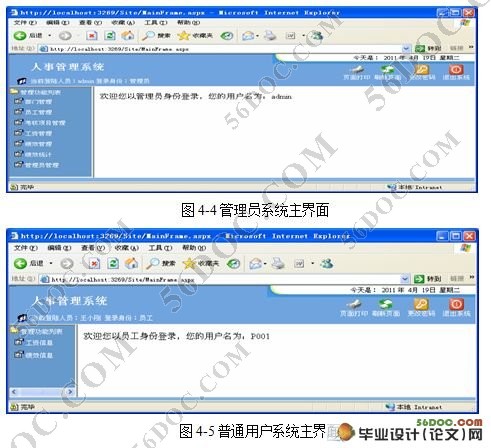
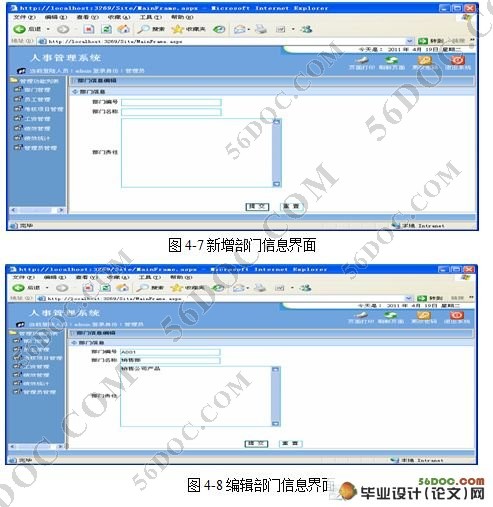
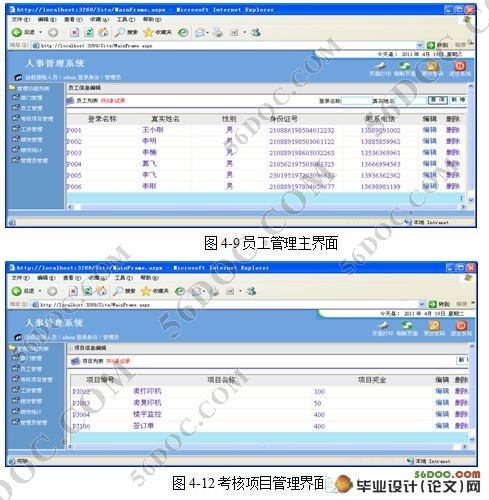
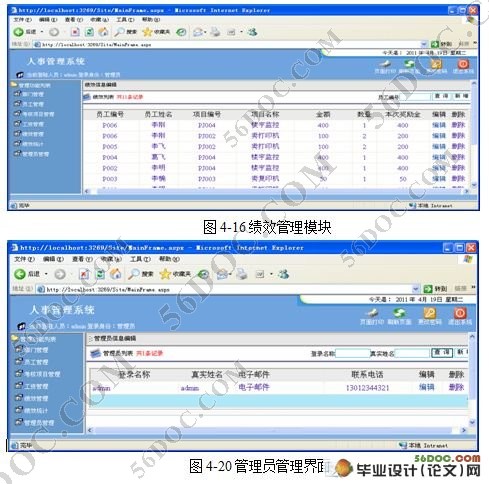
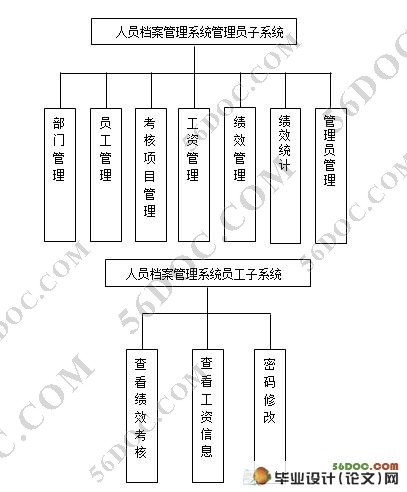
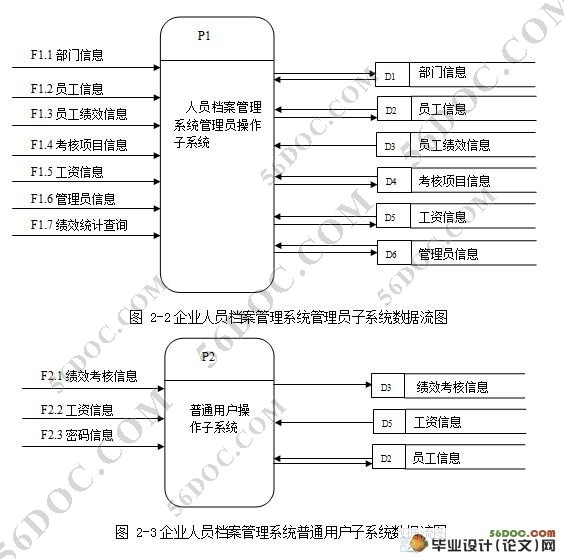
#p#副标题#e#
目 录
摘 要 I
ABSTRACT II
第1章 绪论 1
1.1 系统简介 1
1.2 开发的意义 1
第2章 开发环境及实现技术 2
2.1 开发环境 2
2.1.1 硬件系统 2
2.1.2 软件系统 2
2.1.3 网络环境 2
2.2开发工具简介 2
2.2.1 visual studio2005工具简介 2
2.2.2 sql2005数据库工具简介 3
2.3 实现技术 3
2.3.1 C#编程技术 3
2.3.2 JAVAScript技术 3
第3章 需求分析 5
3.1 公司人员管理系统需求分析 5
3.2 可行性分析 5
3.3 数据流图 6
3.4 数据字典 7
3.4.1数据存储 7
3.4.2数据流 8
3.4.3数据处理 9
第4章 系统设计 10
4.1 系统总体设计描述 10
4.2 系统模块图 10
4.2.1系统总体结构 10
4.2.2系统模块描述 11
4.3 数据库设计 11
4.3.1系统E-R图 12
4.4 安全保密设计 13
4.4.1登录用户的安全性 14
4.4.2操作安全性 14
4.4.3数据安全性 14
第5章 系统设计 15
5.1 详细设计和系统实现步骤 15
5.2 程序语言的选择 15
5.3择程序流程图 15
5.4管理员子系统功能模块的设计 17
5.4.1系统登录模块 17
5.4.2管理员子系统 19
5.4.3部门管理模块 20
5.4.4员工管理模块 23
5.4.5考核项目管理模块 26
5.4.6工资管理模块 29
5.4.7绩效管理模块 29
5.4.8绩效统计管理模块 31
5.4.9管理员管理模块 33
5.4.10密码修改管理模块 35
5.5员工子系统功能模块的设计 37
5.5.1工资信息 37
5.5.2绩效工资信息 38
第6章 测试与维护 39
6.1 测试的任务以及目标 39
6.1.1 测试的任务 39
6.1.2 测试的目的 39
6.2 测试方案 39
6.2.1 测试的任务 39
6.2.2 集成测试 40
6.2.3 验收成测试 40
6.3 测试用例 40
结 论 43
参考文献 44
致 谢 45
